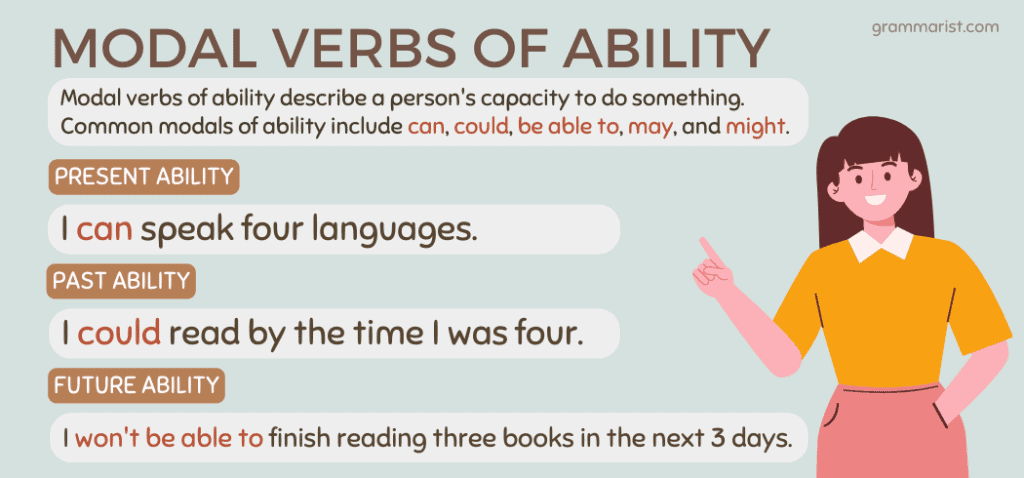Are you struggling with understanding when and how to use modal verbs of ability? They can be problematic even for native speakers! These versatile words are often used in everyday conversation, and mastering them can be hugely beneficial for both communicating effectively and understanding what others mean when they use them!
In this post, I’ll explore modal verbs of ability in detail, including useful examples and a worksheet I made to put your knowledge into practice right away.
Modal Verbs of Ability in a Nutshell

Modal verbs of ability describe a person’s capacity to do something. These types of verbs are used in the present, past, and future tense, with some having different meanings when used in either form. Examples of modal verbs of ability include can, could, and be able to. They typically modify other verbs to convey the concept of capability or incapability.
What Are Modal Verbs of Ability?
Modal verbs of ability are phrases used to express ability, capacity, or probability that something can be done. Modal verbs generally follow the main verb in a sentence and can provide more useful information than normal adjectives.
Common modals of ability include can, could, be able to, may, and might. Can is one of the most popular modals that indicates present abilities to do something or request permission. Could is basically can’s past tense equivalent.
On the other hand, be able to can imply both present and past abilities based on context. As for may and might, although both refer to possibility, might has a lower emphasis on probability compared to may.
All these modal verbs of ability add extra depth to our communication as they reveal more than just literal meanings, allowing us to subtly emphasize certain notions while conversing.
Present Ability
For the present, you can combine can or can’t with generic and specific abilities.
Examples:
- I can speak four languages.
- My brother can’t drive.
Past Ability
When talking about the past, you can combine could and couldn’t to talk about general abilities.
For instance:
- I could read by the time I was four.
- My dog couldn’t stay put for more than five minutes.
When referring to a specific ability in the past, we use couldn’t or was able to:
- I was able to pass my driver’s license exam even though I didn’t feel very confident.
- Vivian couldn’t call her mother last night because she ran out of phone battery.
We use could + have + past participle when describing a past ability that the person in question didn’t use:
- We could have nailed that test if we had studied for it.
- I could have finished law school if I didn’t have to drop out and get a job.
Future Ability
If you want to talk about a future general ability, you use will or won’t be able to:
- I won’t be able to finish reading three books in the next 3 days.
- Lucian will be able to speak fluent French at the end of this six-month course.
For specific abilities, we use can or can’t:
- Uma can help you move to your new apartment this weekend.
- Terry can’t attend classes today. He’s not feeling very well.
Modal Verbs of Ability in Sentences
Here are some examples showing how to use modal verbs of ability in a sentence:
- I could help you Friday when I’m off work.
- John can learn foreign languages really fast.
- Sarah can fix just about any laptop model.
- Natalie might be able to help you study if she finishes her essay on time.
Bottom Line
Phrases that are employed to communicate the ability, capacity, or possibility that something can be done are referred to as modal verbs of ability.
Can is one of the most common modals that is used to signify present capacities to do something or to ask permission to do something. According to the context, the implication of “be able to” includes both current and past capabilities.